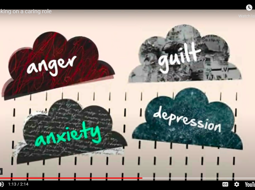Caring for someone with dementia
If you're taking care of someone who has dementia, there can be a lot to take on board. Many people find that staying well informed and developing a network of support can make you feel less alone and more supported.
Where can I find specialist support?
Organisations like Dementia Carers Count, Alzheimer's Society and Dementia UK have some excellent sources of information on their websites. There are multiple resources you can download or order if you need help with particular challenges, such as communicating effectively or helping someone to keep safe in the home.
Finding information that you can trust and understand is important. Here are some useful links:
Factsheets and guides from the Alzheimer's Society
alzheimers.org.uk/get-support/publications-factsheets
Factsheets and guides from Dementia UK
https://www.dementiauk.org/information-and-support/resources/
The Dementia Carers Count website has a virtual carers centre with lots of resources such as podcasts:
https://dementiacarers.org.uk/vcc/
If you have a specific query, you may find these advice lines helpful:
Get in touch with us - Dementia UK
Contact us | Alzheimer's Society
At Dementia Carers Count, you can receive free counselling, benefits advice and practical support if feeling alone, overwhelmed, or worried about money. Carer Support Line: 0800 652 1102
Mon-Fri, 9am to 5pm
We know that looking after someone with such a complex condition can take a toll especially as things progress. You may find some of the following guidance and opportunities to connect with others during this time helpful.
Support from Dementia UK:
dementiauk.org/information-and-support/looking-after-yourself-as-a-carer/
Support from the Alzheimer's Society:
alzheimers.org.uk/get-support/help-dementia-care/getting-support
Support from Dementia Carers Count:
dementiacarers.org.uk/vcc/being-a-carer/
Carers UK
Our Carers UK support sessions offer an opportunity to connect with other carers and find out about matters of interest:
Our guides and sources of support
We have worked alongside specialists with knowledge of dementia to produce some helpful resources about matters that can cause anxiety, such as helping someone to eat well and dealing with continence issues.
Dementia and nutrition
When caring for someone with dementia, it’s important to understand how you can support them to enjoy meals and eat well. It may also be helpful to understand how to deal with difficulties they might face as time goes on. Read more
Continence support
In the video below, Dementia Consultant Nurse Dr Zena Aldridge provides helpful guidance about continence issues, explaining the misconceptions and providing tips to help make life more comfortable. Zena is a published author of multiple journal articles and has contributed to two books relating to dementia care.
We also have an online page which covers some of the common questions about continence issues: Continence care | Carers UK.
Support with day-to-day life
At some point, you might feel it's necessary to alter the home or consider accessories, tech and equipment to help someone who may be having to adapt to living with memory problems. This section of our website offers some ideas to help: Technology and equipment | Carers UK.
It's also a good idea to arrange a needs assessment if the person you are looking after hasn't already had one. The term for this may differ depending on where you live, but essentially this is a review of someone's needs, looking at what will help improve their day-to-day life.
As an unpaid carer, you may also be eligible for a needs assessment. If you are struggling with health issues and are under strain, you can also request one for yourself. You can have this as well as a carer’s assessment.
Depending on where you live, there may be a waiting list for this support. It is worth checking with your local authority or health and social care trust (in Northern Ireland).
Arranging care for someone
As time goes on, you may find that you need additional support to look after someone. Everyone's circumstances are different so it may be a case of trial and error at first, but there are various options you can consider.
If you're looking for extra support at home, using a care agency can be more expensive than employing a care worker directly, but there are certain responsibilities to fulfil if you are taking on the role of an employer to recruit someone directly. Residential care can be a suitable option, often providing some social opportunities. See our online pages for more information and guidance on:
- finding care agencies, see this page
- employing a care professional, see this page
- finding suitable residential care, see this page.
Connecting with others
You can connect to our forum, Carers Connect, to read what others have experienced and share tips. You may find it helpful to search for terms like 'dementia advice' to find threads with relevant discussion.
To post topics or join a conversation on our forum, you need to become a member first. This is free and can give you access to lots of additional support in case you need it – see this link: join us.

How do I take time out?
If you feel in need of a break, try not to feel guilty about making this happen. A change might be beneficial for the person you're caring for, too and you'll be better placed afterwards to give of your best and feel recharged. Often, it is easier to put the needs of those we care for before our own.
See our webpage, Taking a break, for some ideas on how to take some time out. On this page, you can also download a factsheet with a list of organisations that can help with offering a break or respite care.
The animated guide below provides some further suggestions on ways to cope with someone's unpredictable behaviour if this is becoming increasingly exhausting and difficult for you.
Coping with behaviour that can be challenging
This video explores some of the difficulties that can arise from a person's condition(s) if their medication or emotions lead them to behave in unexpected or unpredictable ways. There are some key tips shared to help you feel more supported and in control.




